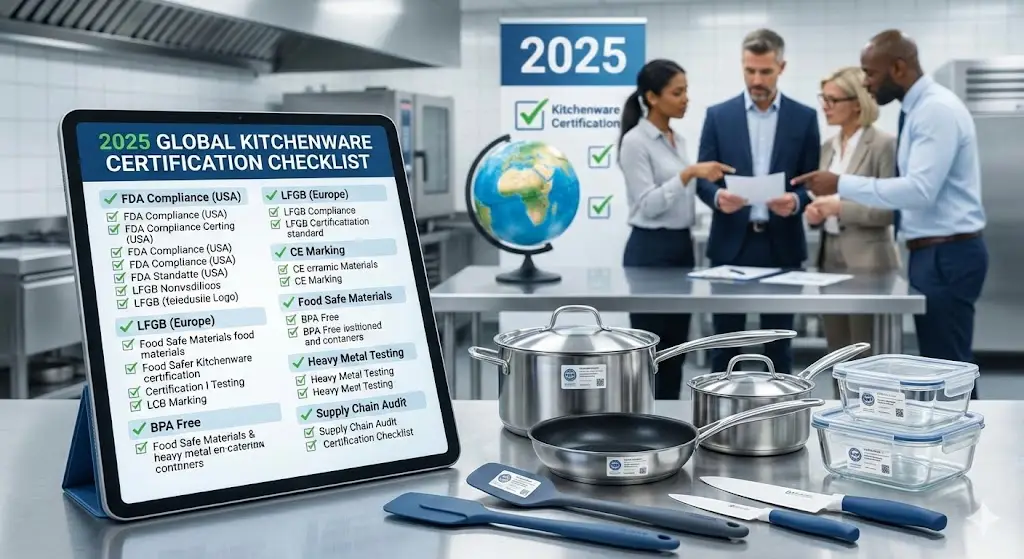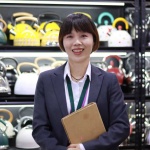
For B2B household kitchenware buyers, ”compliance” is the foundation of cross-border trade—protecting your orders from border delays, maintaining brand reputation, and minimizing long-term risks. From raw material sourcing to final customs clearance, food-safe certifications aren’t just “entry tickets”—they’re legal shields and cost-savers.
In 2025, global demand for “safe” and “healthy” products continues to rise, driving stricter food contact material (FCM) regulations for household kitchenware (cookware set,flatware,whistling kettle, etc.). Drawing on the latest market trends and procurement expertise, this guide breaks down mandatory certifications by key regions (U.S., EU, Japan, Australia/New Zealand, Middle East) to help you source confidently, avoid pitfalls, and partner with compliant suppliers.
Why Certifications Matter for Your Buying Plan
Household kitchenware directly interacts with food, making its safety critical to consumer health. Governments worldwide enforce strict FCM standards covering materials (plastics, metals, ceramics), additives (coatings, adhesives), and migration limits (heavy metals, harmful chemicals).
For buyers, uncertified products risk:
- Customs rejection: Seizures, fines, or destruction at borders;
- Consumer complaints: Health-related claims that damage brand trust;
- Hidden costs: Redesigns, rework, and wasted time/money on non-compliant batches.
Bottom line: Verify certifications beforeplacing orders—it’s the first step to risk-free procurement.
2025 Global Certification Checklist: A Region-by-Region Breakdown
1. U.S. Market: FDA Compliance Is Non-Negotiable
The U.S. regulates kitchenware under the FDA (Food and Drug Administration), focusing on food contact materials (FCMs) across all product types.
Key Certifications/Regulations:
- FDA 21 CFR 175-178: Governs plastics (175-177), coatings (175.300), and adhesives (175.320). Requires testing for migration limits (e.g., lead/cadmium ≤0.5mg/L in food simulants).
- FDA Food Simulant Testing: Simulates acidic (vinegar), alcoholic (ethanol), and fatty (olive oil) food environments to measure chemical migration.
Procurement Tips:
- Avoid “recycled PET” or untested plastics; demand suppliers provide an FDA establishment number (verifiable via the FDA database).
- Coated items (e.g., non-stick pans) require extra testing for coating adhesion and high-temperature stability (FDA recommends ≥200°C tests).
Goldensea’s Compliance Edge: Our ceramic cutlery sets hold FDA certification, while our coated cookware passed FDA food simulant tests . U.S. client reorders surged 30% in 2024.
2. EU Market: LFGB + CE—Safety Meets Sustainability
The EU centers on LFGB (Germany’s Food, Tobacco Products, Cosmetics and Other Daily Necessities Act) for FCMs, paired with CE marking (general safety) and spot checks by DGCCRF (French Directorate-General for Competition, Consumption, and Fraud Prevention).
Key Certifications/Regulations:
- LFGB Certification: Mandatory for all FCMs. Tests include sensory (no off-odors/discoloration), physical (heat resistance), and chemical (heavy metals: lead ≤0.2mg/kg, cadmium ≤0.05mg/kg) compliance.
- CE Marking: Not a “certification” per se, but requires proof of compliance with the General Product Safety Directive (GPSD). Bamboo/wooden items need additional EN 1186 (Food Contact Materials) testing.
- DGCCRF Inspections: Focus on labeling (must state “Food Contact Safe”) and lab report authenticity (from EU-accredited labs like SGS/TÜV).
Procurement Tips:
- For Germany/France (EU’s strictest markets), request SGS or TÜV-issued LFGB reports (small lab reports may be rejected).
- Bamboo/wooden tools must use mold inhibitors free of pentachlorophenol (EU-banned).
Goldensea’s Compliance Edge: Our non-stick cookware passed LFGB certification (test reports available), with 20,000+ units exported to the EU in 2024 showing zero recalls.
3. Middle East: SABER + GCC—Religion, Safety, and Cultural Sensitivity
Saudi Arabia, UAE, and other Middle Eastern markets rely on SABER (Saudi Product Safety Certification) and GCC (Gulf Cooperation Council) certifications, plus Sharia law compliance.
Key Certifications/Regulations:
- SABER Certification: Requires PC (Product Conformity) + SC (Clearance Certificate) steps. Tests include heavy metals (lead ≤0.5mg/kg) and flammability (plastic parts ≥28% oxygen index).
- GCC Certification: For plastics, enforces GSO 1829 (Food Contact Plastics)—bans asbestos, PAHs, and other toxins.
- Meet Local Religious Requirements: Avoid pork/leather (e.g., pig bristle brushes); leather goods need “Halal” slaughter certificates.
Procurement Tips:
- Prioritize aluminum or ceramic (non-controversial, durable, and easy to clean—Middle Eastern consumer favorites).
- Ensure packaging avoids alcohol/pork imagery (text/design must pass local reviews).
Goldensea’s Compliance Edge: All our kitchenware exported to the Middle East complies with GCC certification
4. Japanese Market: JIS + SJ—Precision for Quality-Conscious Buyers
Japan’s standards prioritize safety and functionality, led by JIS (Japanese Industrial Standards) and SJ (Japan Food Hygiene Association) certifications for infant/kid products.
Key Certifications/Regulations:
- JIS A 1901: For stainless steel tools, limits nickel (≤0.1mg/L) and chromium (≤0.05mg/L) migration.
- SJ Certification: Required for infant items (e.g., baby bowls), with strict phthalate limits (≤0.1%).
- BPA-Free Declaration: Japanese consumers avoid BPA-containing plastics; suppliers must provide “BPA-Free” test reports.
Procurement Tips:
- Choose 304/316 stainless steel (JIS-compliant: 304 steel has ≥8% nickel; 316 adds molybdenum for corrosion resistance).
- Plastic items must label “food contact use” in Japanese—or face removal from shelves.
5. Australia & New Zealand: SAA + ACCC—Compliance as a Gateway
Australia/New Zealand unify under SAA (Standards Australia) certification, enforced by ACCC (Australian Competition and Consumer Commission).
Key Certifications/Regulations:
- SAA Certification: Tests fire safety (e.g., plastic handles ≥120°C heat resistance) and mechanical safety (ergonomic knife sharpness).
- ACCC Labeling Rules: Mandates “Made in China” origin labels; plastics must specify material type (e.g., PP, PE).
- AS 2070: For kids’ tools (e.g., plastic bowls), limits phthalates (≤0.1%) and prevent small parts from breaking off.
Procurement Tips:
- Opt for food-grade PP/PE plastics (SAA-approved PP melts at ≥160°C for safer use).
- Avoid recycled plastics; ACCC requires clear “Recycled” labeling if used.
3 Mistakes to Avoid When Sourcing Certified Kitchenware
- Miss “Mandatory” vs. “Optional” Certs: Exporting to the U.S.? FDA is non-negotiable. Skipping LFGB for EU? Expect customs delays.
- Demand Transparent Lab Reports: Ensure reports include lab accreditations (e.g., CNAS, SGS), test dates (valid 1-2 years), and specific migration data (not just “pass/fail”).
- Partner with “Multi-Market” Suppliers: Goldensea’s products hold 10+ global certifications (FDA, LFGB, GCC, etc.), simplifying multi-region sales and reducing your supply chain workload.
Final Thoughts: Compliance Builds Trust—and Long-Term Success
In 2025, global kitchenware competition shifts from price to compliance strength and quality reliability. A supplier that delivers certified, traceable, and region-ready products doesn’t just reduce your risks—it strengthens your brand and customer loyalty.
Ready to source FDA, LFGB, and globally certified kitchenware? Goldensea—backed by 20 years of expertise, 5,000+ SKUs, and end-to-end certification support—partners with you to unlock 2025’s growth.
Contact us today for region-specific certification plans and free sample testing. Let’s grow your business with compliant, trusted products.

Mei is a dedicated Sales Specialist at Goldensea with over 10 years of experience in the B2B kitchenware industry. Possessing deep technical knowledge of manufacturing and sourcing, she has successfully helped countless global clients navigate complex supply chain challenges and find the perfect culinary solutions.
Connect with Mei on LinkedIn or reach out for professional kitchenware advice.
